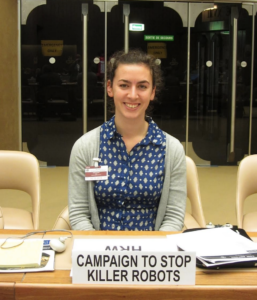Via International Human Rights Clinic
By Anna Khalfaoui, LL.M. ’17
 The Fifth Review Conference of the Convention on Conventional Weapons (CCW) was a great success for advocates of a ban on fully autonomous weapons. Held at the United Nations in Geneva in December 2016, the Conference was also an opportunity for me to discover and reflect on the processes and challenges of the CCW, to which I was a newcomer.
The Fifth Review Conference of the Convention on Conventional Weapons (CCW) was a great success for advocates of a ban on fully autonomous weapons. Held at the United Nations in Geneva in December 2016, the Conference was also an opportunity for me to discover and reflect on the processes and challenges of the CCW, to which I was a newcomer.
I became involved when I attended the Conference as part of Harvard Law School’s International Human Rights Clinic (IHRC). I also contributed to a report that IHRC co-published with Human Rights Watch the week before the Review Conference. Making the Case: The Dangers of Killer Robots and the Need for a Preemptive Ban rebuts the major arguments against a prohibition on the development and use of fully autonomous weapons. These weapons, also known as killer robots and lethal autonomous weapons systems, would be able to select and engage targets without human intervention.
The Review Conference was a key step toward a ban because states parties agreed to formalise talks on killer robots by establishing a Group of Government Experts (GGE), which will meet for 10 days in 2017. This GGE creates the expectation of an outcome as past GGEs have led to negotiation of new or stronger CCW protocols. It provides a forum for states and experts to discuss the parameters of a possible protocol which hopefully will take the form of a ban. The Review Conference also showed that support a ban is gaining traction around the world. Argentina, Panama, Peru and Venezuela joined the call for the first time at the Conference, bringing to 19 the number of states in favour of a ban.
Filed in: Clinical Spotlight
Contact Office of Clinical and Pro Bono Programs
Website:
hls.harvard.edu/clinics
Email:
clinical@law.harvard.edu